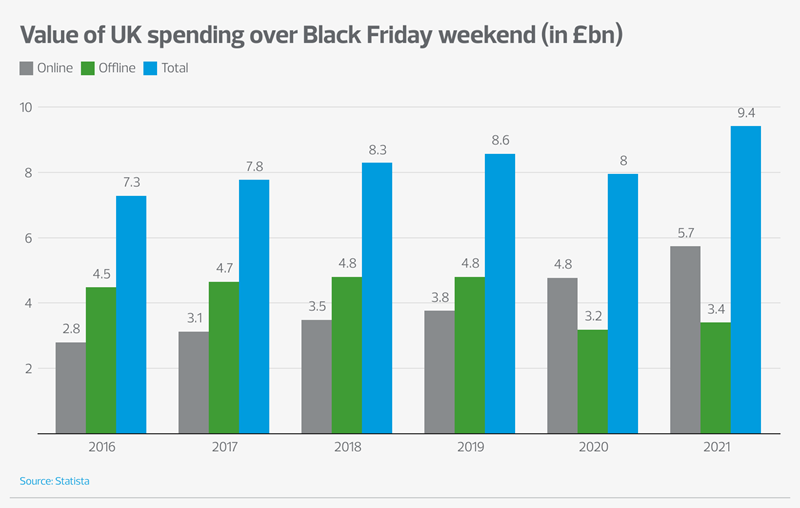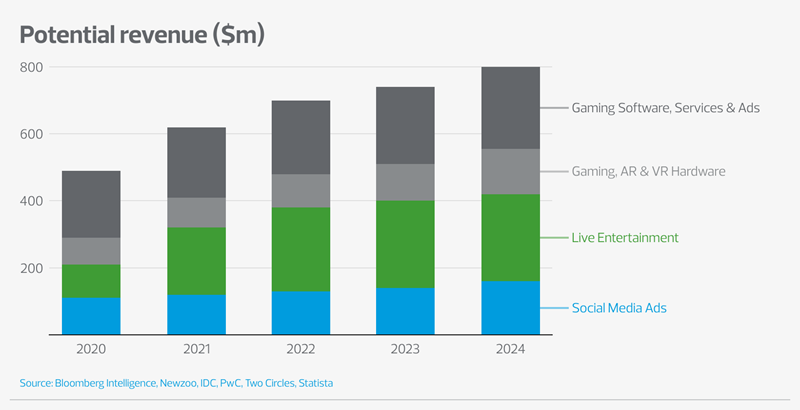23 November 2021
However we define ‘Black Friday,’ it feels that the holiday shopping season has arrived in the United Kingdom. The Black Friday weekend starts on 26 November with Statista forecasting total spend of £9.42bn over the four days. Of that, £5.74bn (61 per cent) is anticipated to be online. In 2019, £3.77bn was spent online from a total of £8.57bn (44 per cent). It is expected that shopping through digital channels will continue to grow. But will this be in a Metaverse?

What is a metaverse?
Metaverses are in the news right now - because of Facebook. In late October, Facebook announced that its parent company would be renamed Meta, and outlined its vision of a ‘set of interconnected digital spaces that lets you do things you can’t do in a physical word… characterised by a social presence, the feeling you’re right there with another person, no matter where in the world you happen to be.’
There are numerous definitions of a metaverse, but a simple definition is the merging of a video game experience and the real world. Imagine putting a headset on in the morning and attending meetings in a digital office. You, your friends and colleagues are represented by an avatar (a digital replica of yourself). After work, you might choose to watch a movie together or, crucially for retailers, go shopping.
Does the metaverse exist yet?
It’s important to recognise that despite its recent name change, Facebook did not create, and does not own, the metaverse. It is a concept that was coined in science fiction that is taking a number of different forms.
Many multiplayer gaming platforms already enjoy enormous user bases, such as Roblox (42.1m daily active users) and Minecraft (131m monthly active users). These platforms are beginning to contain elements reminiscent of a metaverse. Recent high profile expansions of these gaming platforms have included music concerts with artists such as Ariana Grande and Travis Scott. A number of major tech companies, including Nvidia, Disney and Microsoft, have followed Facebook with announcements of high-level plans for investment in the metaverse.
The metaverse is projected to be a US$800m market by 2024 – a comparative drop in the ocean compared to UK Black Friday sales of £9.42bn. The Metaverse is still an emergent technology, but there are already aspects that appear to complement the retail experience. This includes advances in virtual and augmented reality.

Virtual reality vs augmented reality
Virtual reality is a completely virtual world that’s currently accessed through a headset. It feels like entering a video game and allows you to move around in whatever environment the system generates for you.
Current headset technology is predominantly used for immersive gaming. Priced at around £500, it’s still expensive but not prohibitively so. As emerging technology advances the price points tend to come down, leading to an increase the number of homes with headsets.
Augmented reality uses a real-world setting. It uses digital technologies to enhance a real-world reality. This is commonly achieved using a smart phone. Imagine holding your phone up in your living room and selecting different carpets or furniture. Augmented reality would place these carpets and furniture in the room and you would be able to select the items that best suit the room through this digital lens.
Advances in smartphone technology have supported the growing use of augmented reality – the camera technology in an iPhone 13 has a dual 12 mega pixel camera, an OLED display and up to 512GB of capacity. The original iPhone launched with a 2 mega pixel camera, a significantly less powerful display and up to 16GB of storage.
While many of the key enabling technologies needed are developing around us, ultrafast internet that’s crucial to the metaverse realising its potential. A progression from 5G to 6G technologies will be required to handle the enormous amounts of data required by a metaverse.
How will retail work in a metaverse?
The merging of virtual and real-world environments through a metaverse experience creates a range of possibilities. Consumers may choose to enter a virtual world and visit a ‘cyber-mall’ with their friends. These cyber-malls do not need to operate solely as digital replicas of their physical counterparts: You could try on clothes and then instantly transport to a nightclub to see how they look. The customer sales agent from the store can travel with you and your friends to provide advice. The sales agent might be supported by a powerful data-driven tool that provides them with suggested options based on a range of algorithms in the retailer’s data analytics solution.
The blending of the real and digital worlds brings other prospects. Winter is approaching and skis are an expensive purchase, but the metaverse could allow you to digitally test them on your favourite slope in Austria to see how they feel before you buy from a store in central London.
VR and AR technologies are already being applied by businesses. Augmented reality in particular may be a key area for Retailers to consider carefully as these businesses look to make investment in the customer experience. In the longer term it does seem very likely that we will be Christmas shopping in a Metaverse by 2030 in some form.





